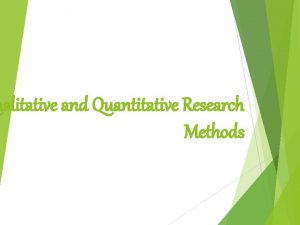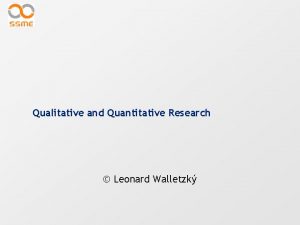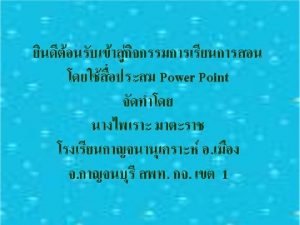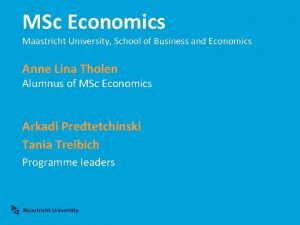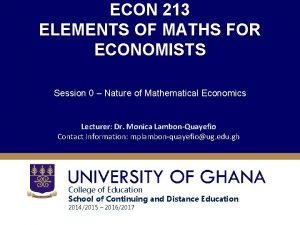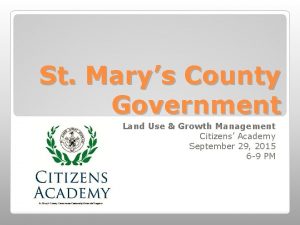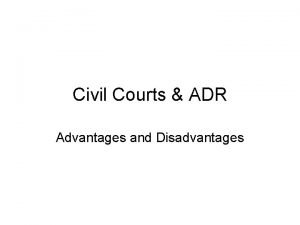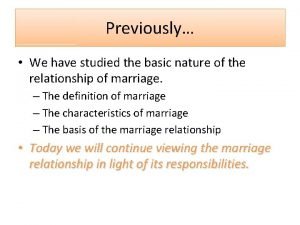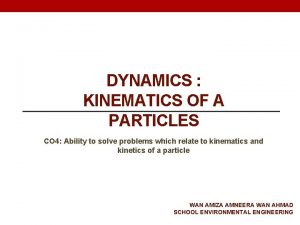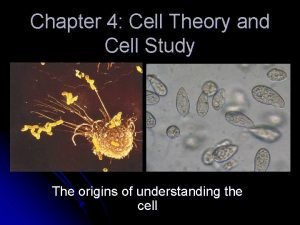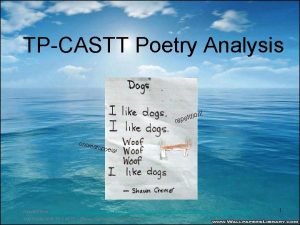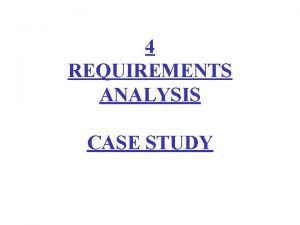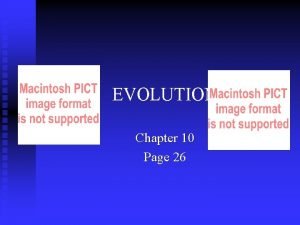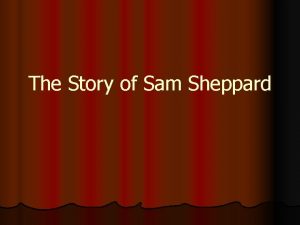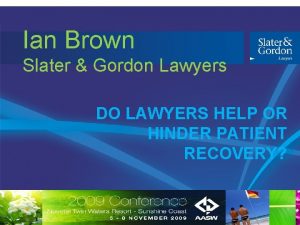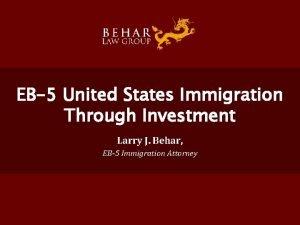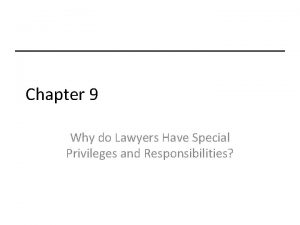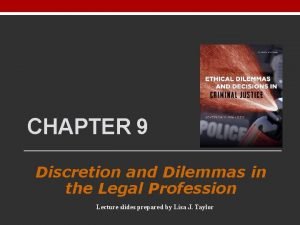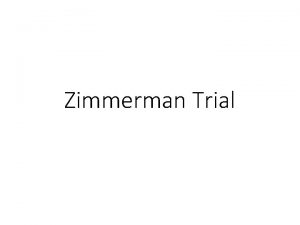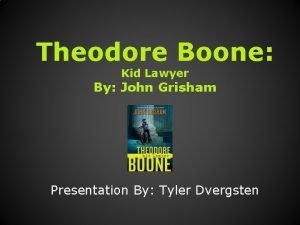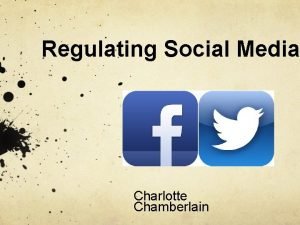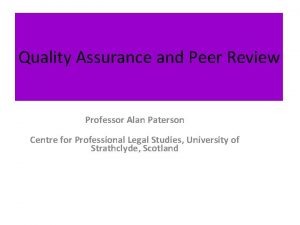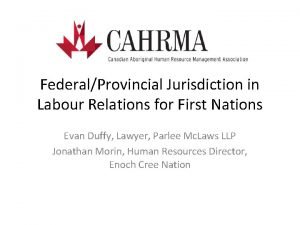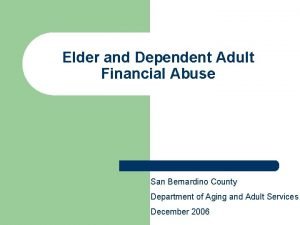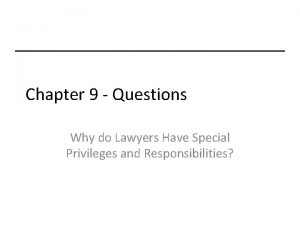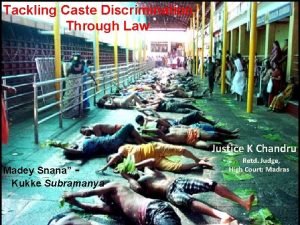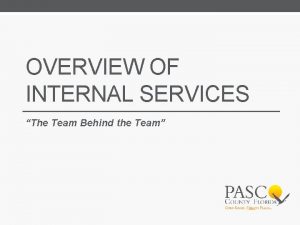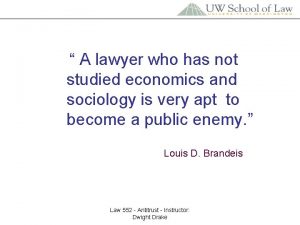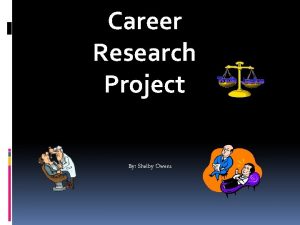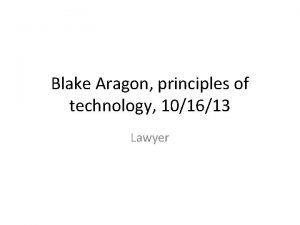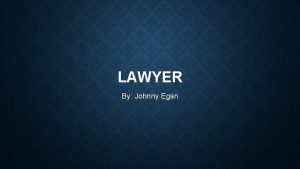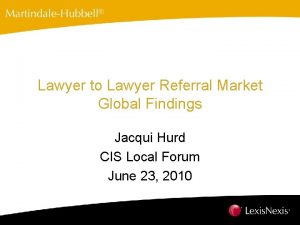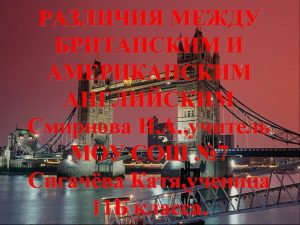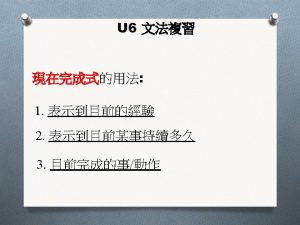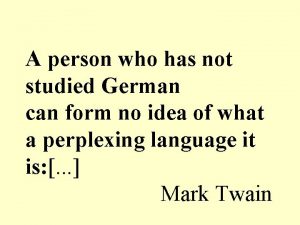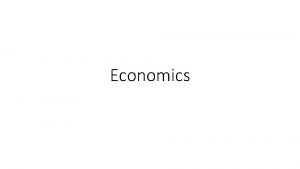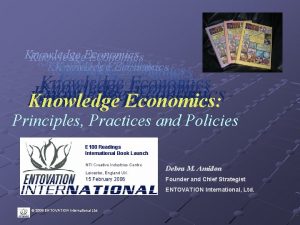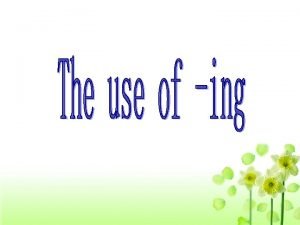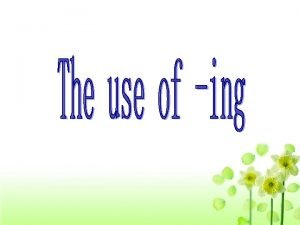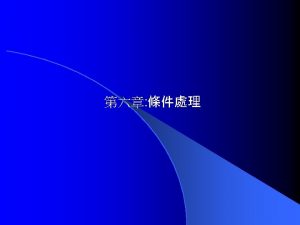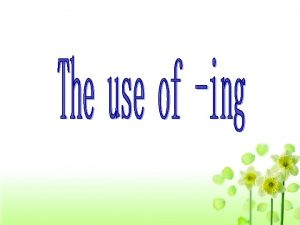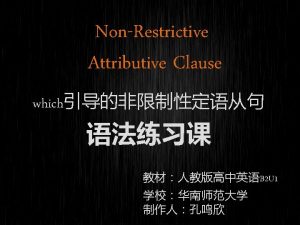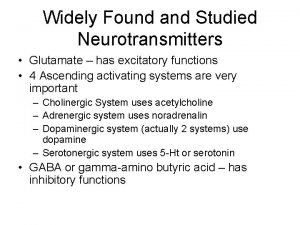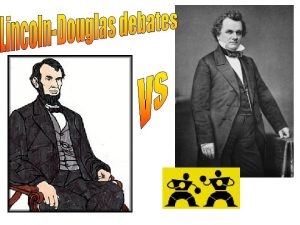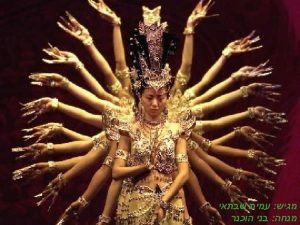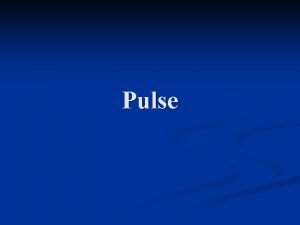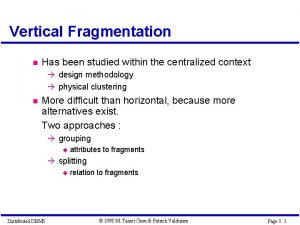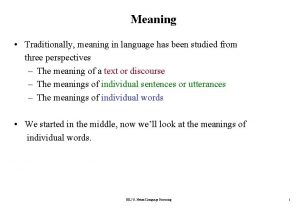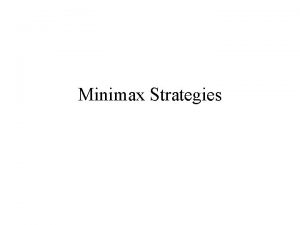A lawyer who has not studied economics and














































- Slides: 46

“ A lawyer who has not studied economics and sociology is very apt to become a public enemy. ” Louis D. Brandeis Law 552 - Antitrust - Instructor: Dwight Drake

Contact Info – Office Hours • Email: djdrake@u. washington. edu • Phones: 425. 281. 1493, 425. 222. 5988, 360. 778. 1862 • Guaranteed Office Hours: - Thursday 11: 30 a. m. to 1: 00 p. m. - By Appointment. Open Door - Whenever you can catch me! Course URL: http: //faculty. washington. edu/djdrake/Antitrust/index. shtml Law 552 - Antitrust - Instructor: Dwight Drake

Course Objectives • Survey history, scope, impact of Antitrust. • Focus on Three Dimensions of Antitrust: - Neighborhood - National - World • Internalize Antitrust “flags”. • Enhance fundamental lawyer skills: - Analytical, creative thinking - Communication Skills Law 552 - Antitrust - Instructor: Dwight Drake

America’s Privately-Owned Businesses • 29 Million • 99 % of all employers • 75% of all new jobs • 53% of private workforce • 70% of all first jobs • 50% of all sales • 14 times more patents • Largest client base for professionals • Badly under-serviced by Bar Law 552 - Antitrust - Instructor: Dwight Drake

The Lawyer’s Role as an Advisor to Business Owners, Professionals and Entrepreneurs Flash Presentation (20 Min. approx) by Dwight Drake Law School Website-Career-Students-Job Resources-Career Tools-Flash Note: It takes a few minutes to load Law 552 - Antitrust - Instructor: Dwight Drake

What Course Is Not! • Hide the flags. • Hunt for the flags. • Memorize the flags. • Wave flags on exam – score! Law 552 - Antitrust - Instructor: Dwight Drake

Grade Criteria • Seven Case Memos (Each 7 Pts) - 49 pts (25%) • Key Team Case Presentation • Take Home Final 21 pts (10%) 130 pts (65%) Total 200 pts Note: Law School Curve Policy in effect. Law 552 - Antitrust - Instructor: Dwight Drake

Final Opt-Out Option • Turn in all seven case observation memos • No more than one memo late • Participate in team case study • Attend class regularly • Guaranteed Grade B Law 552 - Antitrust - Instructor: Dwight Drake

Case Study Game • Number of Weekly Case Studies - 8 • Case Study Teams (5 + persons) - 8 • Key Team for Week has until Friday 5 p. m. to make single email request for additional specific facts • New facts will be provided to Key Team via email within 24 hour of request • Key Team ( two players max) give oral “partner briefing” on following Tuesday (12 Minutes Max). Plus, must provide written memo in Key Player format for entire class. • All others may submit optional written memo in Observer Format. Although optional, there is grade impact. Observer Memo individual, but team dialogue encouraged. Law 552 - Antitrust - Instructor: Dwight Drake

Different Fact Game Economic analysis determines: - What facts are relevant - What facts need to be ascertained - When ascertained, how facts impact or alter economic theory - How best to interpret facts The Challenge: Be good enough to get and apply the right facts! Law 552 - Antitrust - Instructor: Dwight Drake

Memo Presentation Format – Key Team • New facts – The stuff you found • Statement of the key issues • Summary of your conclusions and related rationale • Analysis • Short summation close Law 552 - Antitrust - Instructor: Dwight Drake

Memo Presentation Format -Observers • Desired additional facts • Statement of issues • Preliminary analysis of issues predicated on discovery of additional facts Law 552 - Antitrust - Instructor: Dwight Drake

Writing Basics • • • Four “C”s – Concise, Credible, Confident, Convincing Keep it tight, real tight. No needless words. Use strong, precise verbs. Avoid overstated adjectives. 100% Intellectual honesty – no finessing. Preferred max sentence length: 20 words. Avoid multiple negatives. No “shall”, “provisos”, “and/or” and other drafting jargon. Write for the normal reader, not the intellectual. End sentences emphatically. Organize, then draft. Edit, edit. Law 552 - Antitrust - Instructor: Dwight Drake

US Businesses Projected Revenues 2007 Corporations $ 21. 58 Trillion (84. 2%) Sole Proprietorships $ 1. 23 Trillion (4. 8%) Partnerships $ 1. 35 Trillion (5. 3%) Limited Liab. Companies $ 1. 45 Trillion (5. 7%) Total Copyright 2005 Dwight Drake. All Rights Reserved. Business Planning: Closely Held Enterprises www. drake-business-planning. com $ 25. 61 Trillion Law 552 - Antitrust - Instructor: Dwight Drake

Corporate Players Employees Hire Officers Elect Directors Elect Shareholders Copyright 2005 Dwight Drake. All Rights Reserved. Business Planning: Closely Held Enterprises www. drake-business-planning. com Law 552 - Antitrust - Instructor: Dwight Drake Reg. Agents Appoint

Private Antitrust Suits • Treble damages - deterrence and greed • Uniquely American • High watermark late ’ 70 s – 20 to 1 • Today – 10 private to 1 government • Tougher now – fairness, efficiency values; standing, injury, causation issues • The debate continues Law 552 - Antitrust - Instructor: Dwight Drake

Antitrust Lingo Nail the Glossary NOW! Pages 1 -13 of Supplemental Materials Law 552 - Antitrust - Instructor: Dwight Drake

Horizontal Manufacturer (“OEM”) Distributor Wholesaler Vertical Jobber Retailer Consumer Law 552 - Antitrust - Instructor: Dwight Drake

Overriding Goal of US Antitrust Preserve, protect and maintain public confidence in free market system by deterring and eliminating economic oppression. Law 552 - Antitrust - Instructor: Dwight Drake

Social Goals of U. S. Antitrust • Efficient allocation of goods and services • Prevent “deadweight loss” • Stop “wealth transfer” from market power • Promote innovation – “dynamic efficiency” • Two fading-fast goals: - Protect market entry for individual firms - Decentralize economic power Law 552 - Antitrust - Instructor: Dwight Drake

Antitrust Statutes • Broad statements, ala constitution • Courts have huge interpretive freedom • Courts used “charter of freedom” to gradually define what we call “Antitrust law” • An ever evolving process – at varying speeds and often in varying directions • Tangled with microeconomic analysis that cries out for commentators and experts • Cases heavily fact driven Law 552 - Antitrust - Instructor: Dwight Drake

Sherman Act Section 1 • Every “contract, combination, conspiracy” • In “restrain of trade or commerce” • Justice Hughes in 1933 – a “Charter of Freedom” ala constitution provisions • First two approaches – “Rule of Reason” and “Per Se” doctrines. • Middle ground approach since ’ 78 – “Truncated Rule of Reason” Law 552 - Antitrust - Instructor: Dwight Drake

Sherman Act Section 2 Three criminal offenses: - To monopolize - To attempt to monopolize - To combine or conspire to monopolize Not unlawful to just be a monopolist There must be offensive conduct Separate elements of each offense Law 552 - Antitrust - Instructor: Dwight Drake

Robinson-Patman §§ 2 -3 • Price discrimination unlawful • Must show “substantially lessen competition”, “tend to create monopoly” or “injure, destroy or prevent competition” • No monopolization showing required • Overlap with Sherman 2 where price discrimination in seller’s own market • Burden of proof shift • Exclusive dealing, tying Law 552 - Antitrust - Instructor: Dwight Drake

FTC Act Section 5 • Makes unlawful “unfair methods of competition” and “unfair and deceptive acts and practices” • Empowers FTC • Gives FTC broad power to wade in • Monopolization enforcement heavily influenced by Sherman 2 interpretations Law 552 - Antitrust - Instructor: Dwight Drake

FTAIA of 1982 • Bottom line: Foreigners not protected • Export commerce to foreign nations excluded. • Other foreign commerce included if “direct, substantial, reasonable effect” on: - Non foreign commerce - Import commerce - Injury to export business in US Law 552 - Antitrust - Instructor: Dwight Drake

H. R. 1086 – June 22, 2004 • Increased Sherman Act criminal penalties - $10 mill to $100 mill for corporations - $250 k to $1 mill for individuals - Jail time from 3 to 10 years • Civil penalty drop for squealers – single damages only, no joint and several • Easier on Standard Dev. Orgs – Single damages only, rule of reason applied • Tougher Tunney Act; Approval of consent decrees – Notice and comment period Law 552 - Antitrust - Instructor: Dwight Drake

The Players • Congress • Feds, DOJ & FTC – up and down • The courts – off and running after commerce clause boom of mid-’ 30 s • Academic commentators • State Attorney General Offices • Private antitrust bar Law 552 - Antitrust - Instructor: Dwight Drake

Fed Ups and Downs • • • Vigorous during Taft years (1909 -1913) Slow down in the roaring ‘ 20 s. Hit all time low in depression years 30 -35 FDR’s 1 st term cartel experiments FDR’s 2 nd term started hard-nosed action Enforcement peaked during ’ 60 s Commentators triggered slow down in ’ 70 s Reagan accelerated slow down in ’ 80 s Bush One cranked up a little Clinton turned up more, but nothing like ’ 60 s Bush two more than expected. Obama tough talk – Big Guys Beware Law 552 - Antitrust - Instructor: Dwight Drake

Academic Commentators • Traditionalists – industrial organization economists • Chicago School of Antitrust • Post-Chicago Players Law 552 - Antitrust - Instructor: Dwight Drake

Industrial Org. Economists • Big impact players during ’ 50 s and ‘ 60 s • Structuralists – Number of buyers and sellers and entry barriers were ball game • Assumed market concentration was always anticompetitive • Efficiency no big deal – to tough to prove • Focus was on “Concentration trends” and “Concentration ratios” • Fed and plaintiffs had an easier job Law 552 - Antitrust - Instructor: Dwight Drake

Chicago School • Emerged in ’ 50 s, kicked-in late ’ 70 s • Pioneers from University of Chicago • Rejected “structure” – lead to bad decisions that hurt competition, efficiency • Focus on price theory, efficiency – assumptions of how firms and markets behave • Few prohibitions of ’ 50 s and ’ 60 s were objectionable to Chicago School • Profit maximizing plus efficiency equal “consumer welfare” • Music to ears of conservative political tide Law 552 - Antitrust - Instructor: Dwight Drake

Post Chicago Analysis • Emerged in mid ’ 80 s • Focus – efficiency and wealth transfer • Unlike Chicago, look hard at game theory and strategic conduct of situation • Work inductively from broad inquiry of facts of particular case • New empirical tools for spotting strategic interactions • Biggest impact in “exclusion” cases and new merger guidelines Law 552 - Antitrust - Instructor: Dwight Drake

State AG Offices • May enforce Fed law on behalf of citizens • Treble damages plus attorneys fees • No claim for injury to economy • May sue to stop mergers • 19 states and DC joined Fed in Microsoft litigation Law 552 - Antitrust - Instructor: Dwight Drake

Economic Globalization • A process of integrating national economies through trade, investment, and capital, technology and labor flows • Pre-WWI Globalization: Steam engine, railroad, telegraph • War periods – complete retrenchment • Post WWII actions – IMF, World Bank, ITO, GATT, WTO Law 552 - Antitrust - Instructor: Dwight Drake

Globalization Driving Forces • Technology, innovation • Evolution of money markets • Failure of import-substitution countries • End of Berlin Wall and Soviet Union • Boom ’ 90 s – Near universal buy-in • Proliferation of multinationals • Spread of democracy Law 552 - Antitrust - Instructor: Dwight Drake

Shared Fears • More risks, anxieties from new unknowns, more and different competitors • Spreading gaps between Have and Have-nots, Skilled and Unskilled • New roles for many governments – referee, trainer, safety net • Deadly opposing forces • Environment and oil • Preservation of free market competition Law 552 - Antitrust - Instructor: Dwight Drake

Major U. S. Free Market Challenges • America’s huge oil advantage – Cap and Trade? • Healthcare reform? • Unfathomable, unsustainable deficits • America’s dismal savings capacity • America’s fundamental transformation • Terrorism - the “war”, the cost, the hate Law 552 - Antitrust - Instructor: Dwight Drake

Scenario 1: Basic Facts • Year: 1893 • Location: Cleveland, Ohio • Two major cement contractors – Smith and Jones • They contract: Smith handles all north town business; Jones handles all south business • Goal: To protect their businesses • Larson – Large building contractor in south end doesn’t like Jone’s south-end monopoly Law 552 - Antitrust - Instructor: Dwight Drake

Scenario 1 • In 1893, what would have been best arguments on behalf of Smith and Jone’s position? • In 1893, what would have been best arguments on behalf of Larson’s position? Law 552 - Antitrust - Instructor: Dwight Drake

Questions re: Trans-Missouri Freight • Is price fixing ever good? • Did railroad rate case make it harder for majority? For dissent? • What are liberty of contract, freedom of trade? What are the sources of these rights? • What is protectionism? Is it part of antitrust? Should it be? Law 552 - Antitrust - Instructor: Dwight Drake

Scenario 2: Basic Facts • Year: 1900 • Smith – Jones division contract expanded to four states • Smith – Jones shared a portion of profits, made joint investments and rose to the level of a common law partnership Any new arguments? Law 552 - Antitrust - Instructor: Dwight Drake

Questions: Addyston Pipe & Steel • What percent of market? • Did they set unreasonable prices? Was this relevant to decision? • What is the difference between primary and ancillary restrain, per Taft? • What was impact of common law? • What is impact of public interest factor? Law 552 - Antitrust - Instructor: Dwight Drake

Scenario 3: Basic Facts • Year 1904 • Smith-Jones form New Jersey holding company • Smith-Jones consolidate through holding company. • Smith-Jones acquire 10 other firms through holding company • Divide market in 15 states Law 552 - Antitrust - Instructor: Dwight Drake

Scenario 3 • In 1904, what would have been best arguments against Smith/Jone’s position? • In 1904, what would have been best arguments in support of Smith/Jone’s position? Law 552 - Antitrust - Instructor: Dwight Drake

Standard Oil (1911) • Rockefeller’s Oil Trust – The “Mother of all Trusts” • How bad were the actors? • How significant was common law? • White for majority: Was he consistent with his prior views? • What is “undue restraint”, “standard of reason”? Law 552 - Antitrust - Instructor: Dwight Drake
 Quantitative and qualitative examples
Quantitative and qualitative examples Qualitative vs quantitative
Qualitative vs quantitative If you had studied hard, you wouldn't failed the exam.
If you had studied hard, you wouldn't failed the exam. Maastricht university school of business and economics
Maastricht university school of business and economics Vocabulary workshop level d unit 1
Vocabulary workshop level d unit 1 Econ213
Econ213 Land use and growth management
Land use and growth management Adr advantages and disadvantages
Adr advantages and disadvantages Fill in the blank. you finish your homework today?
Fill in the blank. you finish your homework today? Adolescence definition sociology
Adolescence definition sociology The most studied group is
The most studied group is Have has been ving
Have has been ving Natural history of disease is best studied by
Natural history of disease is best studied by The jukes and kallikaks families studies
The jukes and kallikaks families studies Dugdale
Dugdale We've recently studied the
We've recently studied the The motion of a projectile is often studied in terms of
The motion of a projectile is often studied in terms of Chapter 4 cell theory and cell study
Chapter 4 cell theory and cell study We've recently studied the
We've recently studied the George gray poem analysis
George gray poem analysis Requirement analysis case study
Requirement analysis case study Theories of interpersonal attraction in social psychology
Theories of interpersonal attraction in social psychology As darwin studied fossils what new questions arose
As darwin studied fossils what new questions arose Samuel lopez lawyer
Samuel lopez lawyer Discuss the need for accountancy for lawyers
Discuss the need for accountancy for lawyers Sam sheppard wrestler
Sam sheppard wrestler Ian gordon lawyer
Ian gordon lawyer Eb5 visa attorney lawrence county
Eb5 visa attorney lawrence county Chapter 9 attorney arkansas
Chapter 9 attorney arkansas Chapter 9 attorney columbus
Chapter 9 attorney columbus Was zimmerman convicted
Was zimmerman convicted Theodore boone character traits
Theodore boone character traits Charlotte chamberlain lawyer
Charlotte chamberlain lawyer Alan paterson lawyer
Alan paterson lawyer Parental alienation lawyer logan county
Parental alienation lawyer logan county Cinderella kissed a fella
Cinderella kissed a fella Keri johnson lawyer
Keri johnson lawyer Deepa tailor lawyer
Deepa tailor lawyer Evan duffy lawyer
Evan duffy lawyer Aps report san bernardino
Aps report san bernardino Chapter 9 lawyer
Chapter 9 lawyer Video game lawyer
Video game lawyer Dentist vs lawyer
Dentist vs lawyer Chandru lawyer caste
Chandru lawyer caste Immigration lawyer aifft
Immigration lawyer aifft My son _____ be home by now. where can he be?
My son _____ be home by now. where can he be? Erin brockovich characterization
Erin brockovich characterization
